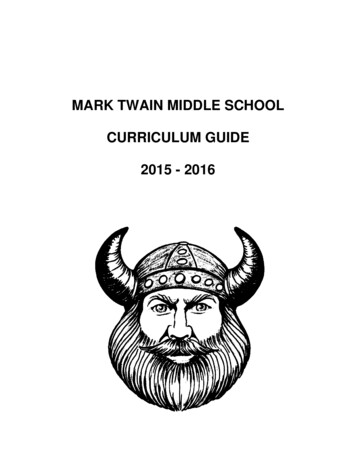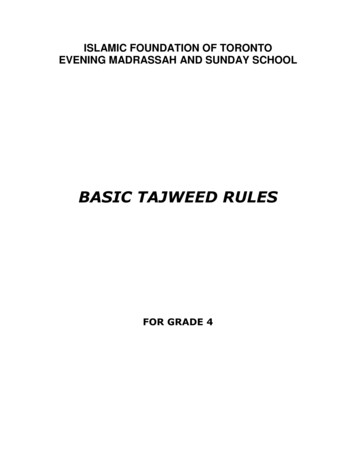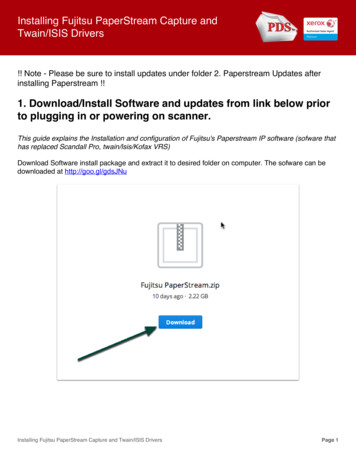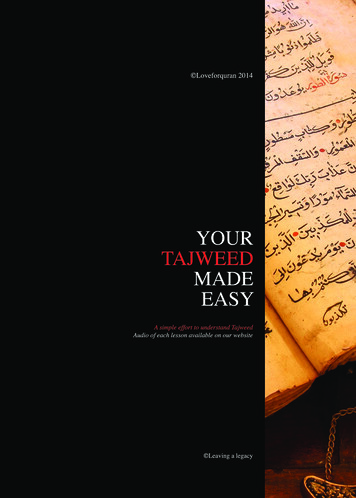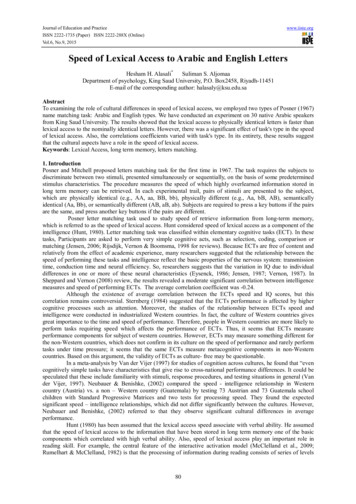
Transcription
www.freeclassicebooks.comThe Letters Of MarkTwain,CompleteByMark Twain(Samuel Clemens)www.freeclassicebooks.com1
www.freeclassicebooks.comVOLUME IBy Mark TwainMARK TWAIN'S LETTERS2
www.freeclassicebooks.comI. EARLY LETTERS, 1853. NEW YORK AND PHILADELPHIA . 4II. LETTERS 1856-61. KEOKUK, AND THE RIVER. END OF PILOTING .22III. LETTERS 1861-62. ON THE FRONTIER. MINING ADVENTURES.JOURNALISTIC BEGINNINGS. .51IV. LETTERS 1863-64. "MARK TWAIN." COMSTOCK JOURNALISM. ARTEMUSWARD.100V. LETTERS 1864-66. SAN FRANCISCO AND HAWAII .115VI. LETTERS 1866-67. THE LECTURER. SUCCESS ON THE COAST. IN NEWYORK.150VII. LETTERS 1867. THE TRAVELER. THE VOYAGE OF THE "QUAKER CITY" .165VIII. LETTERS 1867-68. WASHINGTON AND SAN FRANCISCO. THE PROPOSEDBOOK .180IX. LETTERS 1868-70. COURTSHIP, AND "THE INNOCENTS ABROAD" .205X. LETTERS 1870-71. MARK TWAIN IN BUFFALO. MARRIAGE. THE BUFFALO.232XI. LETTERS 1871-72. REMOVAL TO HARTFORD. A LECTURE TOUR. "ROUGHINGIT.".265XII. LETTERS 1872-73. MARK TWAIN IN ENGLAND. LONDON HONORS.ACQUAINTANCE.275XIII. LETTERS 1874. HARTFORD AND ELMIRA. A NEW STUDY. BEGINNING "TOM.298XIV. LETTERS 1874. MISSISSIPPI CHAPTERS. VISITS TO BOSTON. A JOKE ON 322XV. LETTERS FROM HARTFORD, 1875. MUCH CORRESPONDENCE WITHHOWELLS .344XVI. LETTERS, 1876, CHIEFLY TO W. D. HOWELLS. LITERATURE AND POLITICS.386XVII. LETTERS, 1877. TO BERMUDA WITH TWICHELL. PROPOSITION TO TH.NAST. .4193
www.freeclassicebooks.comI. EARLY LETTERS, 1853. NEW YORK AND PHILADELPHIAWe have no record of Mark Twain's earliest letters. Very likelythey were soiled pencil notes, written to some school sweetheart--to "Becky Thatcher," perhaps--and tossed across at lucky moments,or otherwise, with happy or disastrous results. One of thosesmudgy, much-folded school notes of the Tom Sawyer period would bepriceless to-day, and somewhere among forgotten keepsakes it mayexist, but we shall not be likely to find it. No letter of hisboyhood, no scrap of his earlier writing, has come to light excepthis penciled name, SAM CLEMENS, laboriously inscribed on the insideof a small worn purse that once held his meager, almost non-existentwealth. He became a printer's apprentice at twelve, but as hereceived no salary, the need of a purse could not have been urgent.He must have carried it pretty steadily, however, from itsappearance--as a kind of symbol of hope, maybe--a token of thatSellers-optimism which dominated his early life, and was neverentirely subdued.No other writing of any kind has been preserved from Sam Clemens'sboyhood, none from that period of his youth when he had served hisapprenticeship and was a capable printer on his brother's paper, acontributor to it when occasion served. Letters and manuscripts ofthose days have vanished--even his contributions in printed form areunobtainable. It is not believed that a single number of OrionClemens's paper, the Hannibal Journal, exists to-day.4
www.freeclassicebooks.comIt was not until he was seventeen years old that Sam Clemens wrote aletter any portion of which has survived. He was no longer inHannibal. Orion's unprosperous enterprise did not satisfy him.His wish to earn money and to see the world had carried him first toSt. Louis, where his sister Pamela was living, then to New YorkCity, where a World's Fair in a Crystal Palace was in progress.The letter tells of a visit to this great exhibition. It is notcomplete, and the fragment bears no date, but it was written duringthe summer of 1853.Fragment of a letter from Sam L. Clemens to his sister Pamela Moffett,in St. Louis, summer of 1853:. From the gallery (second floor) you have a glorious sight--theflags of the different countries represented, the lofty dome, glitteringjewelry, gaudy tapestry, &c., with the busy crowd passing to andfro--tis a perfect fairy palace--beautiful beyond description.The Machinery department is on the main floor, but I cannot enumerateany of it on account of the lateness of the hour (past 8 o'clock.) Itwould take more than a week to examine everything on exhibition; and asI was only in a little over two hours tonight, I only glanced at aboutone-third of the articles; and having a poor memory; I have enumeratedscarcely any of even the principal objects. The visitors to the Palace5
www.freeclassicebooks.comaverage 6,000 daily--double the population of Hannibal. The price ofadmission being 50 cents, they take in about 3,000.The Latting Observatory (height about 280 feet) is near the Palace--fromit you can obtain a grand view of the city and the country round. TheCroton Aqueduct, to supply the city with water, is the greatest wonderyet. Immense sewers are laid across the bed of the Hudson River, andpass through the country to Westchester county, where a whole river isturned from its course, and brought to New York. From the reservoirin the city to the Westchester county reservoir, the distance isthirty-eight miles! and if necessary, they could supply every family inNew York with one hundred barrels of water per day!I am very sorry to learn that Henry has been sick. He ought to go to thecountry and take exercise; for he is not half so healthy as Ma thinks heis. If he had my walking to do, he would be another boy entirely. Fourtimes every day I walk a little over one mile; and working hard all day,and walking four miles, is exercise--I am used to it, now, though, andit is no trouble. Where is it Orion's going to? Tell Ma my promises arefaithfully kept, and if I have my health I will take her to Ky. in thespring--I shall save money for this. Tell Jim and all the rest of themto write, and give me all the news. I am sorry to hear such badnews from Will and Captain Bowen. I shall write to Will soon. TheChatham-square Post Office and the Broadway office too, are out of myway, and I always go to the General Post Office; so you must write thedirection of my letters plain, "New York City, N. Y.," without giving6
www.freeclassicebooks.comthe street or anything of the kind, or they may go to some of the otheroffices. (It has just struck 2 A.M. and I always get up at 6, and amat work at 7.) You ask me where I spend my evenings. Where would yousuppose, with a free printers' library containing more than 4,000volumes within a quarter of a mile of me, and nobody at home to talk to?I shall write to Ella soon. Write soonTruly your BrotherSAM.P. S. I have written this by a light so dim that you nor Ma could notread by it.He was lodging in a mechanics' cheap boarding-house in Duane Street,and we may imagine the bareness of his room, the feeble poverty ofhis lamp."Tell Ma my promises are faithfully kept." It was the day when hehad left Hannibal. His mother, Jane Clemens, a resolute, wiry womanof forty-nine, had put together his few belongings. Then, holdingup a little Testament:"I want you to take hold of the end of this, Sam," she said, "andmake me a promise. I want you to repeat after me these words:7
www.freeclassicebooks.com'I do solemnly swear that I will not throw a card, or drink a dropof liquor while I am gone.'"It was this oath, repeated after her, that he was keepingfaithfully. The Will Bowen mentioned is a former playmate, one ofTom Sawyer's outlaw band. He had gone on the river to learnpiloting with an elder brother, the "Captain." What the bad newswas is no longer remembered, but it could not have been veryserious, for the Bowen boys remained on the river for many years."Ella" was Samuel Clemens's cousin and one-time sweetheart, EllaCreel. "Jim" was Jim Wolfe, an apprentice in Orion's office, andthe hero of an adventure which long after Mark Twain wrote under thetitle of, "Jim Wolfe and the Cats."There is scarcely a hint of the future Mark Twain in this earlyletter. It is the letter of a boy of seventeen who is beginning totake himself rather seriously--who, finding himself for the firsttime far from home and equal to his own responsibilities, is willingto carry the responsibility of others. Henry, his brother, threeyears younger, had been left in the printing-office with Orion, who,after a long, profitless fight, is planning to remove from Hannibal.The young traveler is concerned as to the family outlook, and willfurnish advice if invited. He feels the approach of prosperity, andwill take his mother on a long-coveted trip to her old home in thespring. His evenings? Where should he spend them, with a freelibrary of four thousand volumes close by? It is distinctly a8
www.freeclassicebooks.comyouthful letter, a bit pretentious, and wanting in the spontaneityand humor of a later time. It invites comment, now, chiefly becauseit is the first surviving document in the long human story.He was working in the printing-office of John A. Gray and Green, onCliff Street, and remained there through the summer. He must havewritten more than once during this period, but the next existingletter--also to Sister Pamela--was written in October. It isperhaps a shade more natural in tone than the earlier example, andthere is a hint of Mark Twain in the first paragraph.To Mrs. Moffett, in St. Louis:NEW YORK., Oct. Saturday '53.MY DEAR SISTER,--I have not written to any of the family for sometime, from the fact, firstly, that I didn't know where they were, andsecondly, because I have been fooling myself with the idea that I wasgoing to leave New York every day for the last two weeks. I have takena liking to the abominable place, and every time I get ready to leave, Iput it off a day or so, from some unaccountable cause. It is as hardon my conscience to leave New York, as it was easy to leave Hannibal. Ithink I shall get off Tuesday, though.9
www.freeclassicebooks.comEdwin Forrest has been playing, for the last sixteen days, at theBroadway Theatre, but I never went to see him till last night. The playwas the "Gladiator." I did not like parts of it much, but other portionswere really splendid. In the latter part of the last act, where the"Gladiator" (Forrest) dies at his brother's feet, (in all the fiercepleasure of gratified revenge,) the man's whole soul seems absorbedin the part he is playing; and it is really startling to see him. I amsorry I did not see him play "Damon and Pythias" the former characterbeing his greatest. He appears in Philadelphia on Monday night.I have not received a letter from home lately, but got a "'Journal'" theother day, in which I see the office has been sold. I suppose Ma, Orionand Henry are in St. Louis now. If Orion has no other project in hishead, he ought to take the contract for getting out some weeklypaper, if he cannot get a foremanship. Now, for such a paper as the"Presbyterian" (containing about 60,000,--[Sixty thousand ems, typemeasurement.]) he could get 20 or 25 per week, and he and Henry couldeasily do the work; nothing to do but set the type and make up theforms.If my letters do not come often, you need not bother yourself about me;for if you have a brother nearly eighteen years of age, who is not ableto take care of himself a few miles from home, such a brother is notworth one's thoughts: and if I don't manage to take care of No. 1, beassured you will never know it. I am not afraid, however; I shall askfavors from no one, and endeavor to be (and shall be) as "independent as10
www.freeclassicebooks.coma wood-sawyer's clerk."I never saw such a place for military companies as New York. Go on thestreet when you will, you are sure to meet a company in full uniform,with all the usual appendages of drums, fifes, &c. I saw a large companyof soldiers of 1812 the other day, with a '76 veteran scattered here andthere in the ranks. And as I passed through one of the parks lately,I came upon a company of boys on parade. Their uniforms were neat, andtheir muskets about half the common size. Some of them were not morethan seven or eight years of age; but had evidently been well-drilled.Passage to Albany (160 miles) on the finest steamers that ply' theHudson, is now 25 cents--cheap enough, but is generally cheaper thanthat in the summer.I want you to write as soon as I tell you where to direct your letter.I would let you know now, if I knew myself. I may perhaps be here a weeklonger; but I cannot tell. When you write tell me the whereabouts of thefamily. My love to Mr. Moffett and Ella. Tell Ella I intend to write toher soon, whether she wants me to nor not.Truly your Brother,SAML L. CLEMENS.11
www.freeclassicebooks.comHe was in Philadelphia when he wrote the nest letter that has comedown to us, and apparently satisfied with the change. It is aletter to Orion Clemens, who had disposed of his paper, butevidently was still in Hannibal. An extended description of a tripto Fairmount Park is omitted because of its length, its chiefinterest being the tendency it shows to descriptive writing--thefield in which he would make his first great fame. There is,however, no hint of humor, and only a mild suggestion of the authorof the Innocents Abroad in this early attempt. The letter as heregiven is otherwise complete, the omissions being indicated.To Orion Clemens, in Hannibal:PHILADELPHIA, PA. Oct. 26,1853.MY DEAR BROTHER,--It was at least two weeks before I left New York, thatI received my last letter from home: and since then, not a word have Iheard from any of you. And now, since I think of it, it wasn't a letter,either, but the last number of the "Daily Journal," saying that thatpaper was sold, and I very naturally supposed from that, that the familyhad disbanded, and taken up winter quarters in St. Louis. Therefore, Ihave been writing to Pamela, till I've tired of it, and have received noanswer. I have been writing for the last two or three weeks, to send Masome money, but devil take me if I knew where she was, and so the money12
www.freeclassicebooks.comhas slipped out of my pocket somehow or other, but I have a dollar left,and a good deal owing to me, which will be paid next Monday. I shallenclose the dollar in this letter, and you can hand it to her. I knowit's a small amount, but then it will buy her a handkerchief, and at thesame time serve as a specimen of the kind of stuff we are paid with inPhiladelphia, for you see it's against the law, in Pennsylvania, to keepor pass a bill of less denomination than 5. I have only seen two orthree bank bills since I have been in the State. On Monday the hands arepaid off in sparkling gold, fresh from the Mint; so your dreams are nottroubled with the fear of having doubtful money in your pocket.I am subbing at the Inquirer office. One man has engaged me to work forhim every Sunday till the first of next April, (when I shall return hometo take Ma to Ky;) and another has engaged my services for the 24th ofnext month; and if I want it, I can get subbing every night of the week.I go to work at 7 o'clock in the evening, and work till 3 o'clock thenext morning. I can go to the theatre and stay till 12 o'clock and thengo to the office, and get work from that till 3 the next morning; whenI go to bed, and sleep till 11 o'clock, then get up and loaf the rest ofthe day. The type is mostly agate and minion, with some bourgeois; andwhen one gets a good agate take,--["Agate," "minion," etc., sizes oftype; "take," a piece of work. Type measurement is by ems, meaning thewidth of the letter 'm'.]--he is sure to make money. I made 2.50 lastSunday, and was laughed at by all the hands, the poorest of whom sets11,000 on Sunday; and if I don't set 10,000, at least, next Sunday,I'll give them leave to laugh as much as they want to. Out of the 2213
www.freeclassicebooks.comcompositors in this office, 12 at least, set 15,000 on Sunday.Unlike New York, I like this Philadelphia amazingly, and the people init. There is only one thing that gets my "dander" up--and that isthe hands are always encouraging me: telling me--"it's no use to getdiscouraged--no use to be down-hearted, for there is more work here thanyou can do!" "Down-hearted," the devil! I have not had a particle ofsuch a feeling since I left Hannibal, more than four months ago. I fancythey'll have to wait some time till they see me down-hearted or afraidof starving while I have strength to work and am in a city of 400,000inhabitants. When I was in Hannibal, before I had scarcely stepped outof the town limits, nothing could have convinced me that I would starveas soon as I got a little way from home.The grave of Franklin is in Christ Church-yard, corner of Fifth and Archstreets. They keep the gates locked, and one can only see the flat slabthat lies over his remains and that of his wife; but you cannot see theinscription distinctly enough to read it. The inscription, I believe,reads thus:"Benjamin and Franklin"Deborah I counted 27 cannons (6 pounders) planted in the edge of the sidewalk inWater St. the other day. They are driven into the ground, about a foot,14
www.freeclassicebooks.comwith the mouth end upwards. A ball is driven fast into the mouth ofeach, to exclude the water; they look like so many posts. They wereput there during the war. I have also seen them planted in this manner,round the old churches, in N. Y.There is one fine custom observed in Phila. A gentleman is alwaysexpected to hand up a lady's money for her. Yesterday, I sat in thefront end of the 'bus, directly under the driver's box--a lady satopposite me. She handed me her money, which was right. But, Lord! a St.Louis lady would think herself ruined, if she should be so familiar witha stranger. In St. Louis a man will sit in the front end of the stage,and see a lady stagger from the far end, to pay her fare. The Phila.'bus drivers cannot cheat. In the front of the stage is a thing like anoffice clock, with figures from 0 to 40, marked on its face. When thestage starts, the hand of the clock is turned toward the 0. When you getin and pay your fare, the driver strikes a bell, and the hand movesto the figure 1--that is, "one fare, and paid for," and there is yourreceipt, as good as if you had it in your pocket. When a passenger payshis fare and the driver does not strike the bell immediately, he isgreeted "Strike that bell! will you?"I must close now. I intend visiting the Navy Yard, Mint, etc., beforeI write again. You must write often. You see I have nothing to writeinteresting to you, while you can write nothing that will not interestme. Don't say my letters are not long enough. Tell Jim Wolfe to write.Tell all the boys where I am, and to write. Jim Robinson, particularly.15
www.freeclassicebooks.comI wrote to him from N. Y. Tell me all that is going on in H--l.Truly your brotherSAM.Those were primitive times. Imagine a passenger in theseeasy-going days calling to a driver or conductor to "Strikethat bell!""H--l" is his abbreviation for Hannibal. He had first usedit in a title of a poem which a few years before, during oneof Orion's absences, he had published in the paper. "ToMary in Hannibal" was too long to set as a display head insingle column. The poem had no great merit, but under theabbreviated title it could hardly fail to invite notice. Itwas one of several things he did to liven up the circulationduring a brief period of his authority.The doubtful money he mentions was the paper issued byprivate banks, "wild cat," as it was called. He had beenpaid with it in New York, and found it usually at adiscount--sometimes even worthless. Wages and money wereboth better in Philadelphia, but the fund for his mother'strip to Kentucky apparently did not grow very rapidly.16
www.freeclassicebooks.comThe next letter, written a month later, is also to OrionClemens, who had now moved to Muscatine, Iowa, andestablished there a new paper with an old title, 'TheJournal'.To Orion Clemens, in Muscatine, Iowa:PHILADELPHIA, Nov. 28th, 1853.MY DEAR BROTHER,--I received your letter today. I think Ma ought tospend the winter in St. Louis. I don't believe in that climate--it's toocold for her.The printers' annual ball and supper came off the other night. Theproceeds amounted to about 1,000. The printers, as well as otherpeople, are endeavoring to raise money to erect a monument to Franklin,but there are so many abominable foreigners here (and among printers,too,) who hate everything American, that I am very certain as much moneyfor such a purpose could be raised in St. Louis, as in Philadelphia.I was in Franklin's old office this morning--the "North American"(formerly "Philadelphia Gazette") and there was at least one foreignerfor every American at work there.17
www.freeclassicebooks.comHow many subscribers has the Journal got? What does the job-work pay?and what does the whole concern pay?.I will try to write for the paper occasionally, but I fear my letterswill be very uninteresting, for this incessant night-work dulls one'sideas amazingly.From some cause, I cannot set type nearly so fast as when I was at home.Sunday is a long day, and while others set 12 and 15,000, yesterday,I only set 10,000. However, I will shake this laziness off, soon, Ireckon.How do you like "free-soil?"--I would like amazingly to see a goodold-fashioned negro.My love to allTruly your brotherSAM.We may believe that it never occurred to the young printer, lookingup landmarks of Ben Franklin, that time would show points ofresemblance between the great Franklin's career and his own. Yetthese seem now rather striking. Like Franklin, he had been taken18
www.freeclassicebooks.comout of school very young and put at the printer's trade; likeFranklin, he had worked in his brother's office, and had written forthe paper. Like him, too, he had left quietly for New York andPhiladelphia to work at the trade of printing, and in time SamuelClemens, like Benjamin Franklin, would become a world-figure,many-sided, human, and of incredible popularity. The boy SamClemens may have had such dreams, but we find no trace of them.There is but one more letter of this early period. Young Clemensspent some time in Washington, but if he wrote from there hisletters have disappeared. The last letter is from Philadelphia andseems to reflect homesickness. The novelty of absence and travelwas wearing thin.To Mrs. Moffett, in St. Louis:PHILADELPHIA, Dec. 5, '53.MY DEAR SISTER,--I have already written two letters within the lasttwo hours, and you will excuse me if this is not lengthy. If I hadthe money, I would come to St. Louis now, while the river is open; butwithin the last two or three weeks I have spent about thirty dollars forclothing, so I suppose I shall remain where I am. I only want to returnto avoid night-work, which is injuring my eyes. I have received one or19
www.freeclassicebooks.comtwo letters from home, but they are not written as they should be, and Iknow no more about what is going on there than the man in the moon. Oneonly has to leave home to learn how to write an interesting letter toan absent friend when he gets back. I suppose you board at Mrs. Hunter'syet--and that, I think, is somewhere in Olive street above Fifth.Philadelphia is one of the healthiest places in the Union. I wanted tospend this winter in a warm climate, but it is too late now. I don'tlike our present prospect for cold weather at all.Truly your brotherSAM.But he did not return to the West for another half year. Theletters he wrote during that period have not survived. It was latein the summer of 1854 when he finally started for St. Louis. He satup for three days and nights in a smoking-car to make the journey,and arrived exhausted. The river packet was leaving in a few hoursfor Muscatine, Iowa, where his mother and his two brothers were nowlocated. He paid his sister a brief visit, and caught the boat.Worn-out, he dropped into his berth and slept the thirty-six hoursof the journey.It was early when-he arrived--too early to arouse the family. Inthe office of the little hotel where he waited for daylight he found20
www.freeclassicebooks.coma small book. It contained portraits of the English rulers, withthe brief facts of their reigns. Young Clemens entertained himselfby learning this information by heart. He had a fine memory forsuch things, and in an hour or two had the printed data perfectlyand permanently committed. This incidentally acquired knowledgeproved of immense value to him. It was his groundwork for allEnglish history.21
www.freeclassicebooks.comII. LETTERS 1856-61. KEOKUK, AND THE RIVER. END OF PILOTINGThere comes a period now of nearly four years, when Samuel Clemenswas either a poor correspondent or his letters have not beenpreserved. Only two from this time have survived--happily ofintimate biographical importance.Young Clemens had not remained in Muscatine. His brother had noinducements to offer, and he presently returned to St. Louis, wherehe worked as a compositor on the Evening News until the followingspring, rooming with a young man named Burrough, a journeymanchair-maker with a taste for the English classics. Orion Clemens,meantime, on a trip to Keokuk, had casually married there, and alittle later removed his office to that city. He did not move thepaper; perhaps it did not seem worth while, and in Keokuk heconfined himself to commercial printing. The Ben Franklin Book andJob Office started with fair prospects. Henry Clemens and a boynamed Dick Hingham were the assistants, and somewhat later, whenbrother Sam came up from St. Louis on a visit, an offer of fivedollars a week and board induced him to remain. Later, when itbecame increasingly difficult to pay the five dollars, Orion tookhis brother into partnership, which perhaps relieved the financialstress, though the office methods would seem to have left somethingto be desired. It is about at this point that the first of the twoletters mentioned was written. The writer addressed it to hismother and sister--Jane Clemens having by this time taken up her22
www.freeclassicebooks.comhome with her daughter, Mrs. Moffett.To Mrs. Clemens and Mrs. Moffett, in St. Louis:KEOKUK, Iowa, June 10th, 1856.MY DEAR MOTHER & SISTER,--I have nothing to write. Everything isgoing on well. The Directory is coming on finely. I have to work on itoccasionally, which I don't like a particle I don't like to work at toomany things at once. They take Henry and Dick away from me too. Beforewe commenced the Directory, I could tell before breakfast just how muchwork could be done during the day, and manage accordingly--but now,they throw all my plans into disorder by taking my hands away from theirwork. I have nothing to do with the book--if I did I would have the twobook hands do more work than they do, or else I would drop it. It isnot a mere supposition that they do not work fast enough--I know it; foryesterday the two book hands were at work all day, Henry and Dick allthe afternoon, on the advertisements, and they set up five pages anda half--and I set up two pages and a quarter of the same matter aftersupper, night before last, and I don't work fast on such things. Theyare either excessively slow motioned or very lazy. I am not gettingalong well with the job work. I can't work blindly--without system. Igave Dick a job yesterday, which I calculated he would set in two hoursand I could work off in three, and therefore just finish it by supper23
www.freeclassicebooks.comtime, but he was transferred to the Directory, and the job, promisedthis morning, remains untouched. Through all the great pressure of jobwork lately, I never before failed in a promise of the kind.Your SonSAMExcuse brevity this is my 3rd letter to-night.Samuel Clemens was never celebrated for his patience; we may imaginethat the disorder of the office tried his nerves. He seems, on thewhole, however, to have been rather happy in Keokuk. There wereplenty of young people there, and he was a favorite among them. Buthe had grown dissatisfied, and when one day some weeks later therefell into His hands an account of the riches of the newly exploredregions of the upper Amazon, he promptly decided to find his fortuneat the headwaters of the great South-American river. The secondletter reports this momentous decision. It was written to HenryClemens, who was temporarily absent-probably in Hannibal.To Henry Clemens:KEOKUK, August 5th, '56.24
www.freeclassicebooks.comMY DEAR BROTHER,--. Ward and I held a long consultation, Sundaymorning, and the result was that we two have determined to start toBrazil, if possible, in six weeks from now, in order to look carefullyinto matters there and report to Dr. Martin in time for him to follow onthe first of March. We propose going via
the hero of an adventure which long after Mark Twain wrote under the title of, "Jim Wolfe and the Cats." There is scarcely a hint of the future Mark Twain in this early letter. It is the letter of a boy of seventeen who is beginning to take himself rather seriously--who, finding himself for the first


